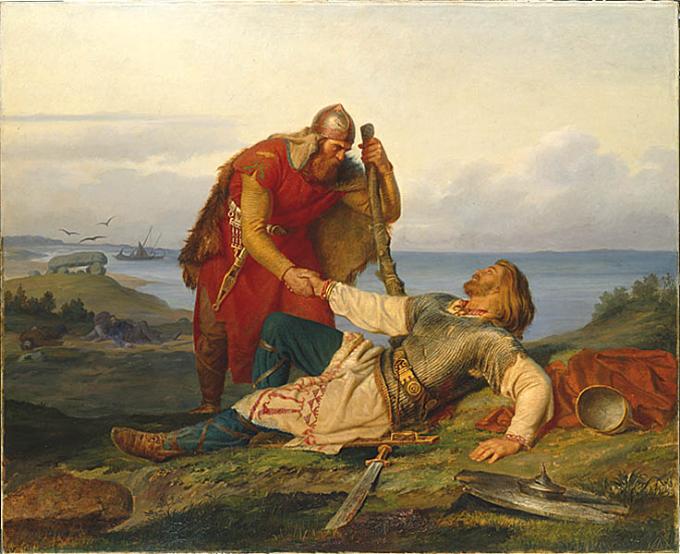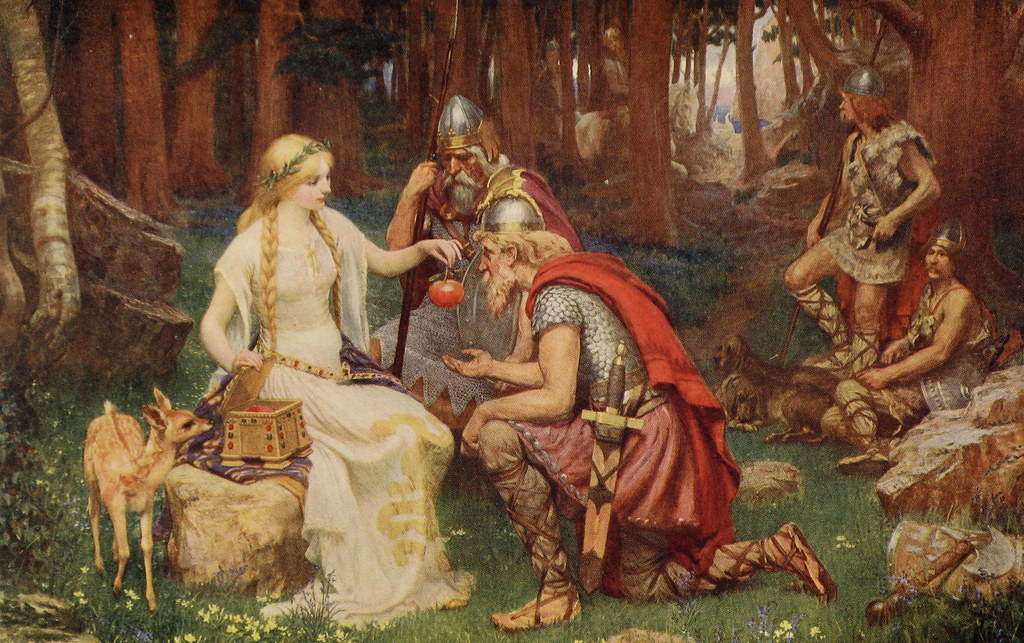
Friends should provide their friends
with weapons and clothing;
this kind of generosity shows.
Generous mutual giving
is the key
to lifelong friendship.
Hávamál Verse 41 – ‘words of the high one’ purported to originate from Odin himself.
Have you ever received a gift? one you treasure? one that ties a further thread in that invisible bond between you and the gifter?
Perhaps it’s something you look at with fondness, or make use of every day. Whether practical or sentimental, giving gifts is a universal practice and one of the many fabrics making up the rich tapestry of human social dynamics.
Through the act of giving – we become tied with others all the more in thought, sentiment, and memory. Most crucially however, we become tied in deed: sparking the higher practice of mutual reciprocity which is much of the beauty and substance of human relationships.
This behaviour has been on my mind more so than ever recently, partly as I was not long ago spontaneously given the practical gift of a raincoat when visiting a friend and caught out by the weather. Turns out this was an article with a little history, having passed through a couple hands while accidentally traveling from the other side of the world. Certainly it’s a decent coat and in fair condition, although on closer inspection one obviously well loved. I’m told this was the original owner’s favourite piece of clothing and he apparently wore it all the time. Knowing that perhaps makes a difference, but it does have that feel to it.
It occurs to me that most of the articles of clothing I have or at least wear every day were given to me. This just adds to the enjoyment I get from them, especially as each was unexpected. There’s something truly extra from donning attire to go out in the world and being able to look at each item and be reminded of the person it came from and why.
An item with a tale also allows us to escape the trap of shallow materialism and reduce our exposure and dependency to crass commercialism. Gifts passed from one person to another have intangible richness, they benefit from pre-vetting/social proofing, plus saving the time and hassle of having to pick through a million choices to buy something, not to mention if say handmade or a ‘regift’ they reduce waste and increase closure within a system. Indeed, these are but a few examples, all of which compound the longer the chain of custodians the item passes through.
A cynic could bring up reasonable problems of historicity, and by no means do I advocate becoming overly attached to objects either, but despite any such flaws, for the brief time we walk this earth such elements add extra seasoning to life while we still remember them. An item with a story, an item with a history – that often really is something worth treasuring.
But gifts need not only be physical objects: experiences, knowledge, humour – all these intangible things are valuable and more than qualify. All gifts are ultimately one of time and attention. There is quite literally however a material difference that objects possess as gifts, and while, to emphasise again, we should never let them rule us, objects make up a central substance of life. A materially better life is, in a sense, one that has been the great project of the history of humanity. But again, it is the intangible things about an object that often make it special: who gave it to you, where it came from, when you got it, etc.
However, it is in the giving of gifts that is by far the best. Few things compare to seeing surprise, delight, and appreciation in the eyes of your family, friends, and neighbours. Especially so after puzzling out what to give with long thought or a moment of serendipity. The joy is in the giving, and it is one of life’s chief pleasures.
Be a friend
to your friend,
and repay each gift with a gift.
Repay laughter
with laughter,
repay treachery with treachery.
Hávamál Verse 42
The beauty of gifting is it entirely blurs the distinction between selfish and selfless. You can make a selfish case for giving simply from the potential benefits, both direct and indirect, returned to you. This is why anonymous charity is arguably the most pure form of charity. But a life of gifting is in part about fostering the ensemble of relationships over time and so by necessity people must have reputation to attribute to. Still, the finest acts of gifting are done with no expectation of anything in return.

That’s not to say gift giving is always successful – as we’ve all received bad gifts. Giving gifts can be a tricky art form, it always depends on the person in question and requires being mindful of them in term of things such as what they will like, what they will find useful, what don’t they have or know about already, etc. along with many other factors like timing also coming into consideration. People are constantly saying things that will give you clues, you just have to pay attention and make note of possibilities as they’re presented.
If you have a good friend,
and really trust him,
and want good to come of your friendship,
you should speak your mind with him,
exchange gifts,
visit him often.
Hávamál Verse 44
There are long traditions of gifting, both formal and informal, the former of which give most regular occasion in the Western world, the likes of Christmas and Birthdays, but there are far more than could ever be put to list. It’s important though to strike that fine balance between custom and spontaneity when giving gifts, as you never want to be too predictable. Gifting is at its most potent when a surprise, which injecting some volatility into the practice ensures. There’s room for both spontaneous giving in the moment and planned presenting, you don’t always need a reason, it can just be mere whim.
One trick is having gifts ‘prepared’ i.e. waiting for the right moment, just as the raincoat was for when circumstance presented itself with the weather. Things like extra copies of books, excess produce from the garden, anything lying around spare, fulfil this optionality well.
I was young once,
I walked alone,
and I became lost on my way.
I felt like I was rich
when I met another traveller-
people’s joy is other people.
Hávamál Verse 47
Worth mentioning are the general tenets of Hospitality. Now while it’s proverbial to not trust Greeks bearing gifts, their important practice of hospitality known as Xenia is one example to be much admired. Guests, generally a traveller on the road, were bestowed with guest rights, food, shelter, gifts, effectively in return for bringing news (information can be invaluable) and with expectation that the guest would return the courtesy if the roles were ever reversed.

This is famously stressed in works such as the Odyssey and such custom of reciprocal back and forth greatly enhanced the quality and safety of larger scale society. When meeting someone new for the first time a gift can be a great way to make that initial step of human connection a positive one towards engaging in a relationship of reciprocity, that over time and iteration, may blossom and become immensely positive sum.
You should not give
only big gifts;
often a little thing will win you favour.
I have won friends
with just half a loaf of bread
and a bowl of soup.
Hávamál Verse 52
Beware becoming caught up in gifting in a competitive and egotistical way. Similarly, try to mind giving beyond your limits, but generosity often means more when you have very little. Big or small, a rule of thumb is to only give one thing at a time, which increases the significance of the gift. Either way, graciousness in giving and in receiving goes a long way. If in doubt food and drink are always among the simplest yet timeless options, and indeed it is gifts of such that probably prompted my friend with the coat.
Living a life of gifting is about the joy of the unexpected. It is about a wholesome practice of all I’ve mentioned, the aspirational act of giving itself, to add value and significance (and maybe the odd running gag) to the lives of people around you. It is about trying to go first in terms of making richer positive relationships leaven to the roundabout benefit of everyone. Perhaps one day, in the remote chance I ever meet the original owner of that coat, I can give it back to him.
